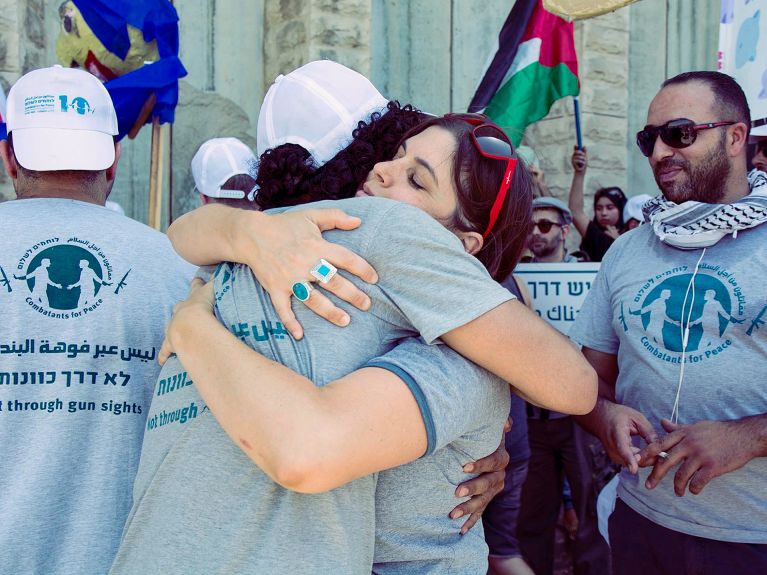Overcoming the split
A German project focuses on reconciliation between Israelis and Palestinians. The work is becoming more and more difficult.

The Middle East conflict has become more complex over the years, and not only because of the issues that separate Israelis and Palestinians. The main adversaries are also divided among themselves. On the Israeli side, settlers, ultra-orthodox, conservative nationalists and socialists are at odds; on the Palestinian side, supporters of the Fatah movement and the Islamic movement Hamas. Experts see these internal divisions as a further obstacle to a peace process. That is why the German programme "Civil Peace Service" and its work for violence prevention and peacebuilding addresses exactly this point. An action in which the forum Civil Peace Service Ltd (forumZFD) take part with a total of ten projects in Israel and the West Bank is named “A Policy of Small Steps”.
Strengthening common interests
"We want to counteract divisions within societies, including narratives”, says Christian Gülisch, forumZFD Regional Officer for the Middle East. This means that identification narratives should be established among Israelis and Palestinians that do not rely on exclusion. “A common exclusive narrative is, ‘We are the Israeli people threatened by the Palestinians’”, explains Gülisch, referring to a model. "In contrast, we try to break down stereotypes and emphasize common interests, such as art and culture." But not only cultural topics are suitable for creating unifying identification experiences. Gülisch gives the example of labour union work for bus drivers in Jerusalem. There are many Palestinians sitting at the steering wheel along with Israelis. Espousing their common interests as workers can help to make ethnic conflicts take a back seat.
The forumZFD has been using this approach since 1999. Since the beginning of the second Intifada in 2000 and the related end of the Oslo Peace Process, which began in 1993, the approach has also been applied to the Middle East. The Federal Ministry for Economic Cooperation and Development supports the project. It comprises the work of currently eight employees from European Union countries and eight local employees in Israel in the project office in East Jerusalem. In 2020, the present project phase expires. Currently, participants are analysing the implications of political developments in Israel and the Palestinian territories in order to continue the work.
Dieses YouTube-Video kann in einem neuen Tab abgespielt werden
YouTube öffnenThird party content
We use YouTube to embed content that may collect data about your activity. Please review the details and accept the service to see this content.
Open consent formA long way to reconciliation
“Unfortunately, the mood in both Israeli society and among the Palestinians is so heated that people are sometimes berated as traitors to their people if they are committed to peace”, says Gülisch. This is another reason why working with civil society groups is becoming increasingly difficult. The Palestinian Authority, for example, has tightened social media laws to such an extent that criticism of the Fatah-dominated administration can result in severe penalties.
Nevertheless, forumZFD manages to work with very different local groups, be it the Israeli Scout Movement, the Workers Organisation, the Student Youth Organisation or even the Palestinian Fatah Youth Organisation. Among the partners, however, there is only one association in which Israelis and Palestinians work together for peace, the Combatants for Peace. Each year, these former soldiers of the Israeli army and former Palestinian paramilitaries organise a joint commemoration of victims of the Middle East conflict. This allows Palestinian and Israeli families to grieve together. Conservative Israelis, however, find the event a provocation, also because it takes place on the eve of the official day of remembrance for fallen Israeli soldiers and victims of terrorism.
“It’s becoming increasingly difficult to find a common space for commemoration”, says Gülisch. “In 2019 and 2018, the event had to be held in a park in Tel Aviv.” Before a far-reaching reconciliation in the Middle East will be possible, there is still a long way to go.
You would like to receive regular information about Germany?
Subscribe here:

